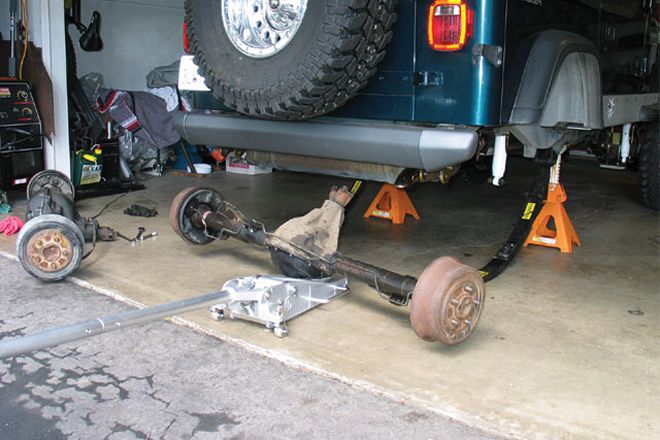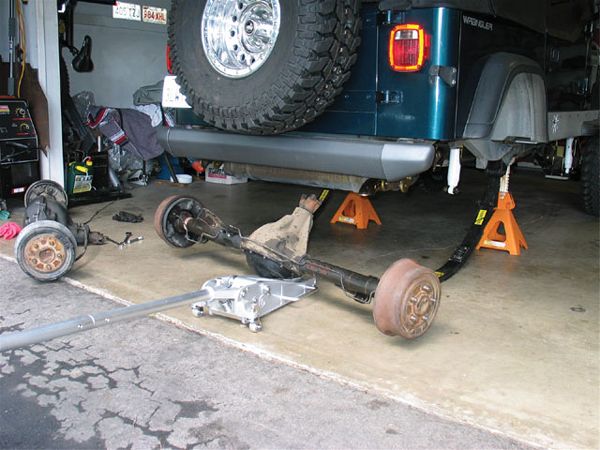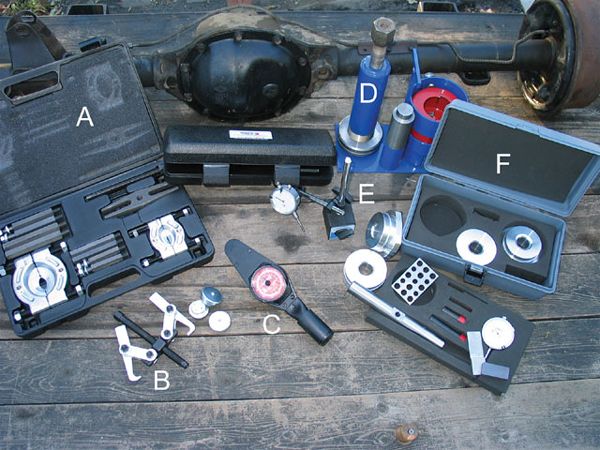
 Christian Hazel
Brand Manager, Four Wheeler
Christian Hazel
Brand Manager, Four Wheeler

Let's say you inherited some property in downtown Crackville. Do you build your dream house there, or do you sell it and put the proceeds towards building your house in a nicer area? That's the way we looked at the Dana 35 rear axle in our '95 YJ. We sort of inherited it when we bought the vehicle, but when it came time to regear our axles, there was no way we were gonna put our hard-earned money into something that would always resemble a rundown dump.
What we did have, however, was the Chrysler 8.25 rear that came with our '99 project Cherokee, JR. More comparable to a Dana 44 in strength, the Chrysler 8.25 offers few drawbacks, namely limited gearing and traction-device choices. And with just about every Cherokee owner swapping them out for a Ford 9-inch or Dana 60, they seem to be everywhere. Since 4.56 is the deepest gear you can get, this may not be the ideal swap for a four-cylinder YJ owner running 33s, but if you've got a 4.0L Wrangler, swapping in an 8.25 will save you some scratch in the long run.

Parts, tools and More parts
You can get an ARB Air Locker, several lunch-box lockers, a Detroit Locker, a Trac-Lok or an Auburn limited slip for the Chrysler 8.25. Since we really didn't want to put a locker in this vehicle, we picked up the phone and called Randy's Ring & Pinion for a Yukon Gear 4.56 ring-and-pinion set, a Yukon installation kit and an Auburn limited slip. For the front high-pinion Dana 30, we opted for a Truetrac from Tractech, along with a Yukon Gear installation kit and 4.56 gears. In a fit of bravado, we thought we'd try our hand at setting up our own gears. Randy's offers a full set of tools for this purpose, but unfortunately the crew can't come to your house and hold your hand through the install. That's why, when we ran into a little difficulty with our story deadline fast approaching, we once again headed to MIT Drivetrain Specialists in El Cajon, California. It's becoming a habit for us to turn to the shop to fix our mistakes, but that's the only way we're gonna learn.
Tools or Shop Time
As we said earlier, installing gears yourself is largely a matter of time and patience, with a little experience thrown in. If you think it's something you want to tackle, you can buy some or all of the tools listed below for about the same price as a gear installation for two axles at a reputable shop. Or, if your time is more valuable, you can leave it to the pros. You decide.
Quoted shop labor: $650, labor only, to install front and rear ring-and-pinion
Tools: Here's where they're from and what they're for:
A. Matco professional bearing separator set with case (PN MST4518). Includes 2- and 3-inch bearing splitter pullers, 91/416 driving screw, 5-inch puller crossbar and several lengths of hex puller legs. Basically lets you get under virtually any bearing on a pinion, carrier or transmission. $119.95.
B. Matco differential bearing puller (PN P57). Includes three adapters to plug axleshaft holes in differential and puller. Lets you easily pull carrier bearings, especially when used in conjunction with MST4518. $51.65.
C. Matco 31/48-drive 150-in/lb dial-torque wrench. Allows you to properly set and measure pinion-bearing preload so your nice new gears don't get destroyed. $160.95.
D. Yukon Gear & Axle bearing puller. Includes main puller body, small and large bearing clamshells, retaining ring, two adjuster rings and axleshaft hole plug. A different way to pull bearings than the conventional bearing puller. Quick and easy to use, but may damage some bearings that aren't sized similarly to clamshell halves. $337.00.
E. Yukon Gear & Axle dial indicator, stand and magnetic base. Allows you to secure base to any housing and position dial indicator correctly on ring-gear tooth to measure backlash. $46.00.
F. Yukon Gear & Axle professional pinion-depth setting kit. Includes dial indicator, varying-length extension tips, magnetic and nonmagnetic target plates, cross-shaft and aluminum bearing hubs. In-depth booklet walks you through how to properly measure for pinion depth using a master-housing dimension (MHD) and the measured pinion-head thickness (PHT) to get the pinion depth (PD) in order to determine the proper shim measurement. Basically eliminates pinion-depth-setting trial and error. $373.00.














